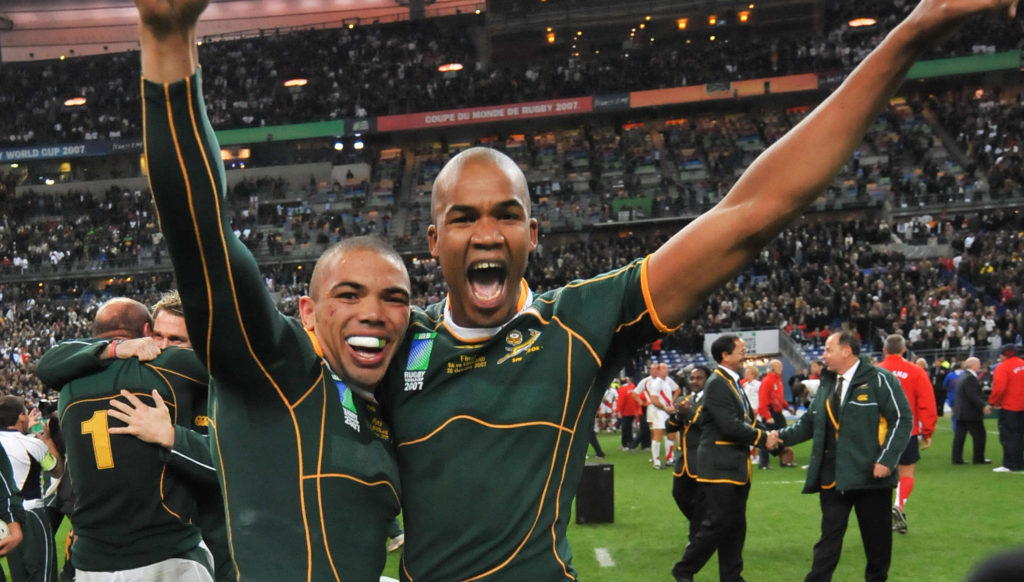Bryan Habana says rugby has the power to bring the important conversations around Black Lives Matter to the forefront.
Habana was speaking to former England centre Will Greenwood in a wide-ranging talk on the latter’s rugby podcast on Sky Sports.
The international Black Lives Matter movement has progressed into rugby circles, with a host of players, including Springbok captain Siya Kolisi and several other former players and coaches, highlighting inequalities within the local rugby system and calling for an end to systemic racism within the game.
KOLISI: Black Lives Matter movement more than about sport
During the podcast, Habana added his voice to the conversation around the movement.
‘It is an extremely important debate,’ Habana said. ‘A debate that I think sport really has the power to bring to the forefront of conversation. I think at the end of this, and as we go through this, the Black Lives Matter movement is about conversation.
‘I have heard Siya Kolisi and Tendai Mtawarira. I am a player of colour in South Africa, but I grew up extremely privileged, so I don’t have the same correlation to some of the stories that they had.
‘I think conversation, hearing people out, is where rugby and its values of respect, understanding, integrity have really come to the forefront, allowing people being able to have those tough conversations. I have seen some of Ugo Monye’s stuff over in the UK, opening up conversation. I think sport has that ability. We have seen Lewis Hamilton using his platform to extraordinary lengths to be able to give a voice to those who so dearly need it.
‘The rugby community is a special one. One that we appreciate and one that we really believe is inclusive. Hopefully, in so doing we make those conversations something that is real and can be had, without discriminating against. ‘
Habana said that South Africa’s past history of racial discrimination meant that the movement had a greater impact in the country.
‘There is definitely a far greater-reaching effect because of our history. People around the world know that South Africa, because of its unique history from a political standpoint, has a very different sporting outlook than any other country in the world. We have had things like transformation charters that have been put in place. We have had a quota system, if one can call it that. No other country faces those types of political barriers to potentially provide a platform where we are all equal because of our history.
‘I often get asked, how can all people of South Africa be given equal opportunity to become a Springbok. If 60% of your population is living in underprivileged or poverty conditions, how are they afforded the same opportunities as those living healthy lives?’
ALSO READ: SA Rugby boss Jurie Roux – We have to own up
Habana added that a conversation with Makazole Mapimpi, where the latter revealed he had to walk 10km to school and back, is one such example of the stories that need to be told and the conversations that need to be had.
‘I had a chat with Makazole Mapimpi a few weeks ago. He said it was 10km to school and 10km from school, five days a week for five years of his life. I sat there absolutely flabbergasted. For me who asked my dad for whatever type of rugby boot I wanted, I was trying to conceptualise that there is a kid who was walking 20km for five years of his life just to get out of his circumstances, to get an education. I can’t even correlate to that. I can’t put myself in a remotely close situation.
‘In South Africa, there are so many more stories like that. Is it a more ingrained conversation that needs to be had in South Africa because of our history? I certainly think so. There is a massive divide between the rich and the poor, the privileged and the underprivileged. How far in history are we going to go to get to that equilibrium? It is so difficult. The stories resonate more because of our history. It is a conversation that needs to be had on a lot more occasions. In so doing, hopefully, we can get to some form of equilibrium. One hopes that through conversation we can get closer to some form of equality.’
Photo: Gallo Images





